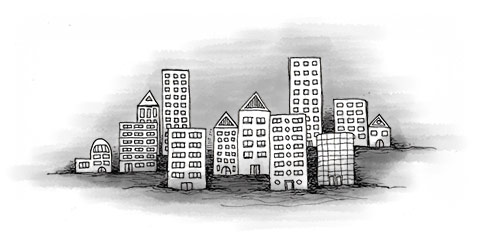Finding a place to live is all about patience and persistence. As in many places, it can be a long, time-consuming and frustrating process. The typical search takes at least 2-3 weeks - in Paris this can take much longer. Don't make the mistake of thinking you will find something and be moving in after a few days!
May to July is the best time for housing hunting. August can be difficult as people are on holiday. September and October tend to be the worst months as people return from vacation and students start a new year. The housing market is also slow over the Christmas period.
Finding a good apartment at the right price before you arrive in France is difficult. Landlords prefer to meet tenants before signing a contract and the wide range of quality means it is not advisable to commit to rent a flat 'unseen'. If you require your living arrangements to be organized before you arrive, you can use an apartment rental service. However, these do tend to be expensive.
Plan on doing a lot of walking. It's a great opportunity to discover the city that will be your new home. The first step to locating accommodation is to familiarize yourself with the different neighbourhoods (quartiers/arrondissements). Buy yourself a pocket-sized street guide (carte or plan) and get to know the local bus and metro lines. Explore different areas, talk to people and spend some time walking around. This will help you decide where you want to live. Do not underestimate the differences which can exist within the same city or town.
Once you have some target areas, the real fun begins. Make sure you know what you are looking for before you start. A list of desired characteristics for your future home is essential, but make sure you split it into 'essential' and 'nice-to-have' items.
Get your point across in French! If you don't speak French very well or are lacking in confidence on the phone, try to find someone who is willing to help. Like just about anywhere, people tend to have less patience with foreigners and will not struggle through a conversation that is going to take half an hour (also, some people might have less confidence in foreigners).
Take some time to write down the questions you want to ask in advance. Also, you might find it useful to prepare a few lines that you will use to describe who you are and what you are looking for. Some preparation might save you some trips to see apartments that are very different from what you want.
Where to look for rented accommodation
Whether you're looking for an apartment or just a room: local knowledge is key. If you're not willing to spend a lot of money on an estate agent, you will have to get used to a housing market that relies a lot on local advertising. Here are some tips for a successful housing search:
1. Networking: Given the lack of rented housing, a lot of the best places are not generally advertised, but are recommended by word of mouth because landlords prefer 'known' tenants. Talk to friends, family members, classmates, work colleagues, etc. and let them know that you are looking for a place to live. The more people that know you are looking, the higher the chance you will be pointed in the right direction.
2. Classifieds: On the basis of quantity, classified advertisements offer the most housing possibilities. The bad news is that competition for the places on offer can be intense. Our advice is to get copies of classifieds when they're published and start calling immediately and be persistent. Many advertisers fill up their schedule for showing the property early in the morning of publication. If you get an answering machine or voicemail, leave a message but keep calling as many people will not return calls.
Lots of newspapers and local magazines have a property section offering rentals. For help in deciphering this abbreviation-full language as well as the French system of counting the number of rooms in the flat, consult our glossary. If the advertisement includes particulier, you should be dealing directly with the landlord (i.e. no agency).
Many publications also offer the possibility of placing a wanted ad - sometimes this is even for free. However, your time might be better employed elsewhere as it is unlikely you will be contacted by a landlord. These are useful when looking for roommates though.
The most popular sources are:
- De particulier à particulier appears each Thursday full of classified advertisements from private individuals. Properties are classified by type and areas. It can be bought at a news-stand or consulted on-line: www.pap.fr (in English, French, Spanish and Portuguese)
- FUSAC (France-USA Contacts) is a popular free website serving English-speaking communities in Paris and its surroundings: www.fusac.fr (in English and French)
- Le Figaro is one of the major French daily newspapers. It has a large classifieds section (it has a good reputation for its French so is also a good way to practice). There is also an on-line edition: www.lefigaro.fr/immobilier (in French only)
- There are also many free local papers full of advertisements and classifieds. They can be found outside shops, bakeries and bars. Be aware that some ads for flats to rent are placed by real estate agencies, which you will only find out about when you call.
- Check out notice boards at the language schools, universities and posters on the street or in small local shops (épiceries). For example, in Paris, the American Churches (Eglises Americaines: 65, Boulevard d'Orsay and 23, Avenue George V), have a very large and popular notice board.
- Le Bon Coin : Many owners post accommodation and rooms on that website as well as other classified ads
3. Websites: There are many property websites. Most are free to search, but on some you have to pay to get contact information.
4. Real estate agencies (Agences immobilières): If you're having trouble finding a place or are in a rush to get settled, you can use an agency.
An agency will typically charge a fee of one month's rent. This is more expensive than renting direct, but can be worth it if time is limited. A positive point of renting through an agency is that is often easier and more straightforward than dealing directly with a landlord. Don't be scared of trying to negotiate a better price with an agent, especially if you find out the flat has been vacant for a while. The worst that can happen is that they turn you down.
5. Use Just Landed's services: put a free notice up in our classifieds or use our housing search
Appointments
Set appointments as soon as possible! The longer you wait -even if it's only a matter of hours - the greater the chance that the apartment will be rented before you get there. Dress well and be prepared for any questions the landlord may ask. If you are not confident in French, try to bring along someone who is to help out. As a foreigner, you need often to be extra convincing.
You might find it useful to go to appointments with cash (or better with your chequebook) in hand, particularly if the apartment was advertised in a newspaper. However, you should not say yes to the first flat you see. Always try to visit several places to get a feeling about the market and price you are willing to pay. Also, don't let the competition scare you into signing a contract unless you are sure. Having said all that, the best advice is, when a good flat comes up, to grab it! If you take a day to decide, you might well find your dream flat already taken by someone else.
Very often, being first in line does not guarantee you will get the flat as landlords are choosy with tenants. French law gives a lot of protection to tenants. I.e. during winter (mid-october to mid-march) you can't be evicted, even if you do not pay your rent. In addition, eviction procedures are complicated and long, as tenants have the right to appeal.
Due to normally strong demand and tenant protections, landlords often take their time choosing a tenant to minimise their risk of non-payment and future problems. Sometimes you will be asked for a 'dossier' about yourself and the selection procedure can take a few weeks! Enquiries about yourself may be a lot more in depth that in your home country.
Typically, you may be asked about your: nationality, status in France, profession, job and type of employment contract (employees in a probation period, with a temporary contract and freelance professions are often not welcome), your income (which should be about 3 times higher then the rent and charges), information about your family, etc.
Be prepared for these questions and expect to bring the following documents (and copies):
- your residence permit and passport
- recent pay slips (preferably the last three months) or other proof of income, such as an employment contract. If you are a student, on a low income or planning on looking for work, a good tip might be to include your parent's proof of income (pay slips) in your dossier as this may help strengthen your case with the landlord
- your last tax declaration (especially if you are self-employed)
- a certificate from your bank (not your account balance, but stating you are a 'good' client)
- a letter from your parents (if you are a student) or other guarantor
A good tip before you commit to an apartment is to visit the area during the day and at night to see what it's like, or ask around. Perfectly peaceful areas during the day can turn into unbearable residential areas at night if there are bars nearby. Likewise, a calm neighbourhood in the evening may be a nightmare during the day due to traffic or construction works.




